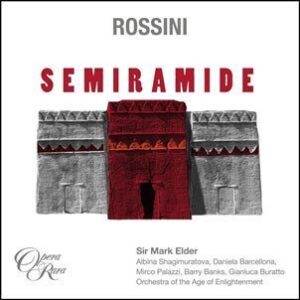This, Rossini’s 34th, is his longest and last Italian opera. It is a behemoth–just under four hours of music, with a 10-minute overture, a 25-minute, multi-part introduction, lengthy, complex finales to each act, six multi-sectioned arias (including a “mad scene” for bass), a trio, and four duets. I find its willful combination of ascetic and ornate both confusing and unconvincing–even the overture keeps moving around from light to crabby and back with manic string figures alternating with or interrupted by brass outbursts and sweet woodwind riffs.
The eponymous heroine has murdered her husband before the curtain rises and the opera is a series of confrontations and inner conflicts until Semiramide’s own son, Arsace, must punish her for the murder. Semiramide’s partner in crime is Assur, who, along with Arsace, and an Indian King, Idreno, is in love with the Princess Azema ( who has less than five minutes of music to sing). When Arsace returns to Babylon disguised, Semiramide falls in love with him, a situation that doesn’t work out. Supernaturally, the ghost of the murdered King pops up twice. Love this opera if you will, but it’s a dramatic mess. There is a good chance that you might see Semiramide as a tragic figure–ruler of Babylon, guilty murderess, and authoritative in every line she utters–but she is surrounded by so many roulades that it’s hard to find her.
This recording, not only due to its completeness, but for Mark Elder’s conception in trying to make it the stately, grand work its composer conceived rather than merely a showcase for singers (viz: Bonynge, Sutherland, Horne, on Decca), becomes the standard. He gives the singers enough room for individual expression and embellishments (a bit too many at times–see below), so it succeeds on that level as well, and the spotless period-instrument Orchestra of the Age of Enlightenment clarifies much of Rossini’s complex sound world.
Elder has gathered a superb cast. The Russian coloratura Albina Shagimuratova sings the heck out of Semiramide, of course without the plenitude of volume offered by Joan Sutherland, but with equally fluent coloratura, more pointed diction, and a sense of urgency when the notes themselves don’t get in the way. The top of her voice extends even higher than Sutherland’s and we are treated to high Es and the occasional F, rock solid, if sometimes alarming. Daniela Barcellona’s handsomely sung Arsace will not eclipse memories of Marilyn Horne’s gloriously sung, acrobatic, massive Arsace, but Barcellona is a great artist, and her rhythmic vitality and commitment to the part are stunning. She and Shagimuratova blend beautifully in their two duets, even if they are, even by Rossinian standards, somewhat overly embellished.
The villainous Assur is assuredly sung by Mirco Palazzi, remarkably navigating the role’s many pitfalls and approaching greatness in his last-act Mad scene. Barry Banks’ agile singing and pointed delivery of the text make up for the character’s almost entire lack of purpose in the opera; the many high Bs, Cs, and Ds hold no fears for the tenor. Gianluca Buratto offers a dignified Oroe. And so if you take this not as an epic melodrama or drama but rather as a spectacular singing festival, rich with individually moving moments, there is no way not to be very, very pleased with this recording.
































